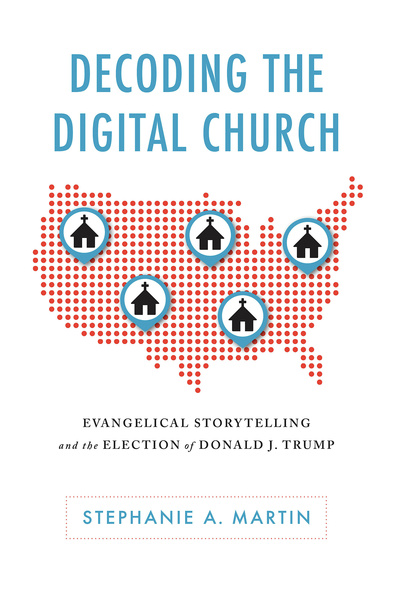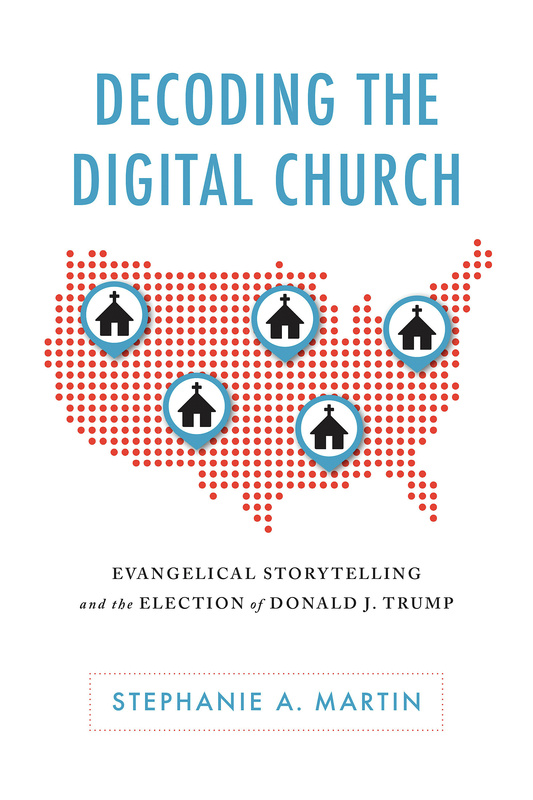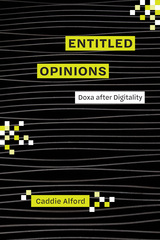Decoding the Digital Church
Evangelical Storytelling and the Election of Donald J. Trump
University of Alabama Press
"This investigation tries to understand why many Evangelical pastors were blamed for endorsing Trump when, in fact, most did not. This book joins other attempts by scholars and journalists to analyze the relationship between Trump and Evangelicals. Recommended.” —CHOICE
As a political constituency, white conservative evangelicals are generally portrayed as easy to dupe, disposed to vote against their own interests, and prone to intolerance and knee-jerk reactions. In Decoding the Digital Church: Evangelical Storytelling and the Election of Donald J. Trump, Stephanie A. Martin challenges this assumption and moves beyond these overused stereotypes to develop a refined explanation for this constituency’s voting behavior.
This volume offers a fresh perspective on the study of religion and politics and stems from the author’s personal interest in the ways her experiences with believers differ from how scholars often frame this group’s rationale and behaviors. To address this disparity, Martin examines sermons, drawing on her expertise in rhetoric and communication studies with the benefits of ethnographic research in an innovative hybrid approach she terms a “digital rhetorical ethnography.” Martin’s thorough research surveys more than 150 online sermons from America’s largest evangelical megachurches in 37 different states. Through listening closely to the words of the pastors who lead these conservative congregations, Martin describes a gentler discourse less obsessed with issues like abortion or marriage equality than stereotypes of evangelicals might suggest. Instead, the politicaleconomic sermons and stories from pastors encourage true believers
to remember the exceptional nature of the nation’s founding while also deemphasizing how much American citizenship really means.
Martin grapples with and pays serious, scholarly attention to a seeming contradiction: while the large majority of white conservative evangelicals voted in 2016 for Donald J. Trump, Martin shows that many of their pastors were deeply concerned about the candidate, the divisive nature of the campaign, and the potential effect of the race on their congregants’ devotion to democratic process itself. In-depth chapters provide a fuller analysis of our current political climate, recapping previous scholarship on the history of this growing divide and establishing the groundwork to set up the dissonance between the political commitments of evangelicals and their faith that the rhetorical ethnography addresses.
As a political constituency, white conservative evangelicals are generally portrayed as easy to dupe, disposed to vote against their own interests, and prone to intolerance and knee-jerk reactions. In Decoding the Digital Church: Evangelical Storytelling and the Election of Donald J. Trump, Stephanie A. Martin challenges this assumption and moves beyond these overused stereotypes to develop a refined explanation for this constituency’s voting behavior.
This volume offers a fresh perspective on the study of religion and politics and stems from the author’s personal interest in the ways her experiences with believers differ from how scholars often frame this group’s rationale and behaviors. To address this disparity, Martin examines sermons, drawing on her expertise in rhetoric and communication studies with the benefits of ethnographic research in an innovative hybrid approach she terms a “digital rhetorical ethnography.” Martin’s thorough research surveys more than 150 online sermons from America’s largest evangelical megachurches in 37 different states. Through listening closely to the words of the pastors who lead these conservative congregations, Martin describes a gentler discourse less obsessed with issues like abortion or marriage equality than stereotypes of evangelicals might suggest. Instead, the politicaleconomic sermons and stories from pastors encourage true believers
to remember the exceptional nature of the nation’s founding while also deemphasizing how much American citizenship really means.
Martin grapples with and pays serious, scholarly attention to a seeming contradiction: while the large majority of white conservative evangelicals voted in 2016 for Donald J. Trump, Martin shows that many of their pastors were deeply concerned about the candidate, the divisive nature of the campaign, and the potential effect of the race on their congregants’ devotion to democratic process itself. In-depth chapters provide a fuller analysis of our current political climate, recapping previous scholarship on the history of this growing divide and establishing the groundwork to set up the dissonance between the political commitments of evangelicals and their faith that the rhetorical ethnography addresses.
Martin explores the intersection between religion and politics in a variety of evangelical contexts, specifically political sermons by white conservatives about the election of Donald Trump. This investigation tries to understand why many Evangelical pastors were blamed for endorsing Trump when, in fact, most did not. This book joins other attempts by scholars and journalists to analyze the relationship between Trump and Evangelicals. Recommended.’ —CHOICE
‘Decoding the Digital Church offers a compelling and readable analysis of evangelical sermons around contemporary politics from the 2008 recession through the Trump election. For newcomers to religious rhetoric, this book will surely provide an accessible introduction to the mystifying relationship between evangelicals and Republican politics.’
—Kristy Maddux, author of The Faithful Citizen: Popular Christian Media and Gendered Civic Identities
Why did so many white, Christian evangelicals vote for Donald Trump? Stephanie Martin compellingly argues that the answer lies in the storytelling logic of evangelical sermons. Decoding the Digital Church is a timely and nuanced exploration of contemporary sermon rhetoric that speaks to the future of both the evangelical church and American democracy.’
—Jonathan J. Edwards, author of Superchurch: The Rhetoric and Politics of American Fundamentalism
‘Long before most of us started attending church virtually in 2020, Martin was ‘going to church in my pajamas’ to study the sermons of White evangelical megachurch pastors.… Her analysis of sermons over several years leading up to the election of Donald Trump offers important insights into how we got to where we are religiously and politically. This book reminds us that words matter, especially those about the Word.’
—Public Witness
Stephanie A. Martin is associate professor of corporate communication and public affairs at Southern Methodist University. She is coauthor of Visual Ethics: A Guide for Photographers, Journalists, and Filmmakers and editor of Columns to Characters: The Presidency and the Press Enter the Digital Age.
Acknowledgments
Introduction
Chapter 1. Evangelicals and the Continuous Reawakening to the Greatest Story Ever Told
Chapter 2. Rhetorical Criticism: Going to Church in My Pajamas
Chapter 3. America Is (Still) Great
Chapter 4. Don’t Worry, Be Happy—But God Wants You to Vote
Chapter 5. Do Unto Others?
Chapter 6. #MeToo Goes to Church
Conclusion
Appendix A. Rhetorical Sample of Sermons from the Great Recession and Recovery
Appendix B. Rhetorical Sample of Sermons from the Presidential Campaign of 2016
Notes
Bibliography
Index











